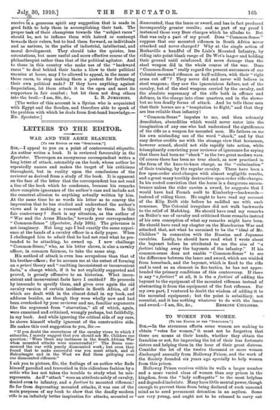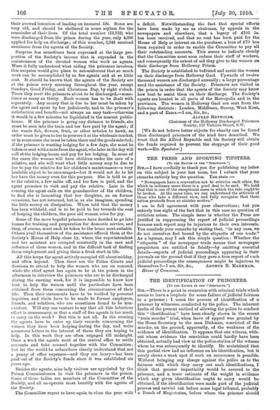TO WOMEN FOR WOMEN.
[To THE EDITOR Or THE "SPECTATOR."J SIE,—In the strenuous efforts some women are making to obtain " votes for women," it must not be forgotten that there are means at their hands, whether they obtain the franchise or not, for improving the lot of their less fortunate sisters and helping them in the hour of their great distress. Consider the lot of the twelve thousand or more women discharged annually from Holloway Prison, and the work of the Society founded six years ago specially to help women from this prison.
Holloway Prison receives within its walls a larger number and a more varied class of women than any prison in the kingdom, from the "lady suffragette" to the most helpless and degraded inebriate. Many have little mental power, though enough to prevent them from being declared of such unsound mind as to need permanent detention in an asylum. Some are very young, and ought not to be released to carry out their avowed intention of leading an immoral life. Some are very old, and should be sheltered in some asylum for the remainder of their lives. Of the total number (13,132) who were discharged from the prison during the year, only 4,386 applied for help on discharge; of this number, 3,949 received assistance from the agents of the Society.
Surprise has sometimes been expressed at the large pro- portion of the Society's income that is expended in the maintenance of the devoted women who work as agents. Were it fully understood what aiding the prisoners involves, this surprise would give place to astonishment that so much work can be accomplished by so few agents and at so little cost. It should be known that the agents of the Society are at the prison every morning throughout the year, except Sundays, Good Friday, and Christmas Day, by eight o'clock. There they meet the prisoners about to be discharged,—eome- times as many as thirty. Each woman has to be dealt with separately. Any money that is due to her must be taken by the agent and spent by her judiciously, and to the prisoner's satisfaction and benefit—not always an easy task—otherwise it would in a few minutes be liquidated in the nearest public- house. If the prisoner is going any distance to friends, she must be seen into the train and her fare paid by the agent; if she wants fish, flowers, fruit, or other articles to hawk, an order must be given to her to procure it at the wholesale market, or in some cases she must be taken there and the goods selected ; if the prisoner is wanting lodging for a few days, she must be taken or sent with a note from the agent, who later in the day will call at the lodging-house and pay for her lodging. In some of the cases the woman will have children under the care of a relative, and she will want what little money may be due to her to pay the relative for her children's maintenance—a very laudable object to be encouraged—but it would not do to let her have the money even for this purpose. She is told to go to the relative, a few miles off, and her fare is paid, and the agent promises to visit and pay the relative. Late in the evening the agent calla on the grandmother of the children, to find she is lamenting that her daughter, as on former occasions, has not returned, but is, as she imagines, spending the little money on dissipation. When told that the money has been withheld, and is to be paid to her towards the cost of keeping the children, the poor old woman cries for joy.
Some of the more hopeful prisoners have decided to go into homes for training and preparation for domestic service, and they, of course, must each be taken to the home most suitable. Others avail themselves of the assistance offered them at the Society's House of Help close by, where the superintendent and her assistant are occupied constantly in the care and influence of these women, and in the difficult task of finding them employment and giving them a fresh start in life.
All this keeps the agent actively occupied till about midday, and often beyond. Then there are the Police Courts and Sessions to attend to help the women who are on remand, while the chief agent has again to be at the prison in the afternoon to interview the prisoners who are to be discharged during the ensuing week, for it is impossible to know how best to help the women until the particulars have been obtained from them concerning the circumstances of their life. Then their statements have to be verified by personal inquiries, and visits have to be made to former employers, friends, and relatives, who are sometimes found to be non- existent. Will any one venture to say that all this laborious effort is unnecessary, or that a staff of five agents is too much to carry on the work P But this is not all. In the evening the agents have to enter up their records concerning the women they have been helping during the day, and write numerous letters in the interest of those they are hoping to help. In this work they are often engaged till midnight. Once a week the agents meet at the central office to settle accounts and take counsel together with the Committee; but let the would-be subscribers clearly understand that not a penny of office expenses—and they are heavy—has been paid out of the Society's funds since it was established six years ago.
Besides the agents, nine lady visitors are appointed by the Prison Commissioners to visit the prisoners in the prison. Some of these ladies are members of the Committee of the Society, and all co-operate most heartily with the agents of the Society.
The Oommiaee regret to have again to close the year with a deficit. Notwithstanding the fact that special efforts have been made by me as chairman, by appeals in the newspapers and elsewhere, that a legacy of £105 5s. has been received, and that no rent has been paid for the House of Help or interest on the purchase, a loan of £70 has been required in order to enable the Committee to pay all their outstanding accounts. This seems to indicate clearly that the Committee must soon reduce their staff of workers, and consequently the extent of aid they give to the women on their discharge from Holloway Prison.
The Society is established to befriend and assist the women on their discharge from Holloway Gaol Upwards of twelve thousand women are discharged annually; a large percentage need the assistance of the Society. Prisoners are visited in the prison in order that the agents of the Society may know how best to assist them on their discharge. The Society's agents are located in all parts of the Metropolis and in the provinces. The women in Holloway Gaol are sent from the following districts : London, Middlesex, Surrey, West Kent,. and a part of Essex.—I am, Sir, &c., ALFRED REYNOLDS,
Chairman of the Holloway Discharged Prisoners Society, 117 Victoria Street, S.W. - [We do not believe better objects for charity can be found than discharged prisoners of the kind here described. We trust that Sir Alfred Reynolds and his Society will obtain the funds required to prevent the stoppage of their good work.—En. Spectator.]







































 Previous page
Previous page